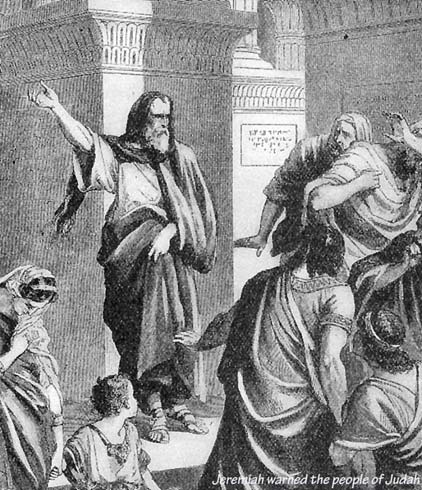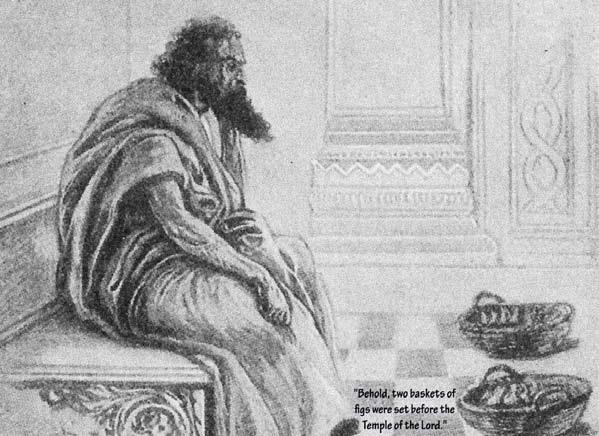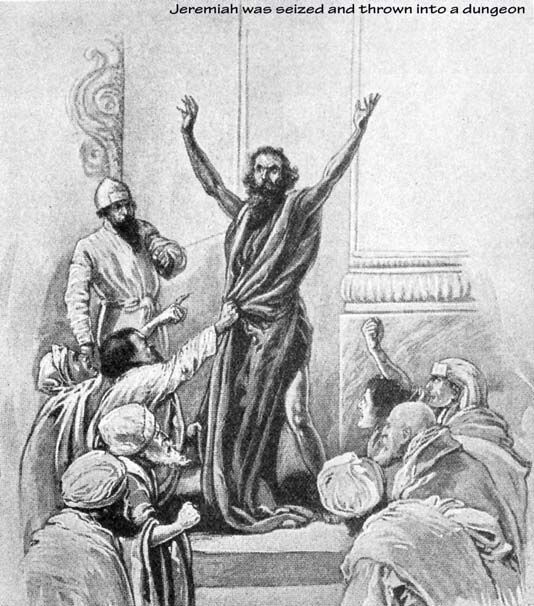
Stories From The Hebrew Bible
THE LAST FOUR KINGS OF JUDAH AND THE WEEPING PROPHET

Stories From The Hebrew Bible
THE LAST FOUR KINGS OF JUDAH AND THE WEEPING PROPHET
When the good King Josiah fell in battle, the people of the land made his son, Jehoahaz, king. At that time all the kingdoms around Judah were in confusion. The great empire of Assyria ruled nearly all that part of the world; but now it was broken up. Nineveh, its chief city, had been destroyed and Egypt, Babylonia, and other lands were at war, each striving to take the place of Assyria as ruler of the nations.
For a time, Pharaohnechoh, king of Egypt, whose warriors had slain King Josiah, became master of the lands between Egypt and the Euphrates River. He did not trust the young King Jehoahaz, so he took his crown from him and carried him away to Egypt as a captive. As a result, Jehoahaz, the seventeenth king, reigned for only three months. The prophet Jeremiah, who arose during Josiah’s reign, said of the young king who so soon was taken away as a prisoner:
Weep not for the dead King Josiah nor sorrow over him, but weep for him who goes away, the King Jehoahaz, for he shall return no more nor shall he again see his own land. In the place where they have led him captive, there he shall die, and he shall look upon this land no more.
The man whom Pharaohnechoh set up as king over Judah in place of Jehoahaz was his brother Jehoiakim, another son of Josiah. But he was not like his father. He lived most wickedly, and led his people back to the idols which Josiah had tried to destroy. Jeremiah, the prophet, spoke the Words of the Lord to him and warned that the evil way he was going would surely end in ruin to both the king and the people. This made King Jehoiakim very angry. He tried to kill the prophet. But, to save his life, Jeremiah was hidden by his friends.

Jeremiah could no longer go out among the people nor stand in the Temple to speak the Word of the Lord. So he wrote God’s message on a roll, and gave it to his friend Baruch to read before the people. While Baruch was reading it, some officers of the king came and took the roll away and brought it to the king. King Jehoiakim was sitting in his palace, with the princes around him, and a fire was burning before him, for it was the winter time. The officer began to read the roll before the king and the princes, but when he had read a few pages, the king took up a knife and began cutting the leaves and throwing them into the fire. Even the princes were shocked at this, for they knew that the writing on the roll was God’s Word to the king and the people. They begged the king not to destroy the roll, but he would not listen. He went on cutting up the roll and throwing it in the fire, until it was all burned. The king wanted to kill Jeremiah the prophet, and Baruch, who read his words; and he would have if he had found them. But they hid and he could not find them – the Lord kept them safe.
Jehoiakim reigned a few years as the servant of the king of Egypt. But soon the Egyptians lost all the lands that they had gained outside of their own country. The Babylonians, under Nebuchadnezzar, rose to power over the nations and took the empire that had been held by the Assyrians. Nebuchadnezzar was the son of the king of Babylon, and at first was the general of his army. He came against Judah and Jerusalem, but Jehoiakim did not dare fight with him. He promised to serve Nebuchadnezzar, and, on that condition, was allowed to remain king. However, no sooner had the Babylonian army gone away, than Jehoiakim broke his promise and rose up against Babylon and tried to make himself free.
But, King Jehoiakim did not succeed. Instead, he lost his kingdom and his life. He was slain either by the Babylonians or by his own people. His dead body, like that of a beast, was thrown outside the gate of the city. Jehoiakim had reigned in wickedness eleven years, and died in disgrace.
Jehoiakim’s young son, Jehoiachin, who was also called Coniah or Jeconiah, was then made king by the people. But he reigned only three months, because Nebuchadnezzar, king of Babylon, was conquering all the lands. Nebuchadnezzar came with his army and took the city of Jerusalem. He carried the young king into Babylon as a captive, just as Nechoh had carried Jehoahaz to Egypt as a captive eleven years before. Along with King Jehoiachin, many of the nobles and rulers and the best people of the land were also taken away. Most of these were worshipers of the Lord. They carried a love for the Lord with them to the land of Babylonia, and they served him there, because their trouble only drew them closer to God. After these captives had been taken away, the Lord showed a vision to Jere- miah in the Temple – a vision of what would come to pass. Jeremiah saw two baskets of figs. One basket was full of fresh, ripe figs, the best that could be found. The other basket was full of poor, decayed figs, not fit to be eaten. The Lord said, “Jeremiah, what do you see?”

And Jeremiah said, “Figs; the good figs very good; and the bad figs very bad; figs so bad that they cannot be eaten.” Then the Lord said to Jeremiah,
The captives who have been taken away to the land of Babylon are like these good figs. I will care for them and keep them and will bring them back to this land. I will give them a heart to know Me; and I will be their God, and they shall be My people. And the bad figs are like those who are left in this land, the king who shall reign over them and his princes and his people. They shall suffer and die by the sword and by famine and by plague, until they are destroyed.
God showed Jeremiah in this way that the captives in Babylon were the hope of the nation. And afterward Jeremiah sent a letter to these captives, saying,
The Lord says to those who have been carried away captive, “Build houses and live in them; and plant gardens and eat the fruit of them; and have sons and daughters, and let your children be married in that land when they grow up. And pray the Lord to give peace to the city and the land where you are living, for you and your children shall stay there seventy years; and after seventy years they shall came again to their own land in peace. For My thoughts, says the Lord, are thoughts of peace and kindness toward you. You shall call upon Me and I will hear you. You shall seek Me and find Me, when you seek Me with all your heart.”
After Jehoiachin and the captives had been taken away, Nebuchadnezzar set up Zedekiah as king in Judah. Zedekiah was the uncle of Jehoiachin, and was another son of Josiah. He was the twentieth and last king of the kingdom of Judah. He began by promising to be true and faithful to his overlord, Nebuchadnezzar, the king of Babylon, who had made him king. But very soon he was led by the nobles who stood around his throne to break his promise and to throw off the rule of Babylon; also he left the worship of the Lord, as did his people, and began to pray to the idols of wood and stone that could give him no help.
Jeremiah the prophet told King Zedekiah that he was doing wickedly by breaking his promises and turning from the Lord to idols. Jeremiah told Zedekiah that he would fail and bring his kingdom to ruin. The prophet said,
It is better to obey the king of Babylon than to fight against him, for God will not bless you and your people in breaking your word. The king of Babylon will come and destroy this city. You shall see him face to face, and he will take you away as a captive to his own land, and this city shall be destroyed.
This made the princes and nobles very angry against Jeremiah. They said, “This man Jeremiah is an enemy of his land and a friend to the king of Babylon. He is a traitor, and should be put to death.”
Zedekiah said to his nobles, “Jeremiah is in your hands; you can do with him what you choose. The king cannot help him against you.”
Then these men seized Jeremiah and took him to the prison and threw him into a dungeon, down below the floor and filled with mud and filth, into which the prophet sank; and there they left him to die. But in the court of the king there was one kind man, a man named Ebedmelech. He found Jeremiah in the dungeon. He let a rope down to him, drew him up, and took him to a safe and dry place, though still in the prison.
By this time Nebuchadnezzar, the king of Babylon, and his army were again before the city of Jerusalem, laying siege to it. No one could go out or come in; no food was available for the people, so many of them starved to death. The soldiers of Nebuchadnezzar built forts and threw darts and stones, broke down the gates, and made big openings in the walls of the city.

When King Zedekiah saw that the city was falling before its enemies, he tried to escape. But the men of Babylon followed and took him prisoner, along with all his wives and sons. They were all brought before King Nebuchadnezzar, so that it came to pass as the prophet had said, Zedekiah saw the king of Babylon.
But he saw something else that was even more terrible; he saw all his sons slain. Then Zedekiah’s eyes were put out and as a blinded captive he was dragged away to Babylon. The Babylonian soldiers killed all the leaders of the people who had led Zedekiah to rebel against Nebuchadnezzar. The rest of the people, except the very poorest in the land, were taken away to the land of Babylon. The king of Babylon was friendly to Jeremiah, the prophet, because of the advice Jeremiah had given to Zedekiah and his people. The ruler, whom Nebuchadnezzar set over the city, opened the door of Jeremiah’s prison and allowed him to choose between going to Babylon with the captives or staying with the poor people in the land. Jeremiah chose to stay. However, he was later taken to Egypt by enemies to the king of Babylon. And there in Egypt Jeremiah died. His life had been sad, because he had seen nothing but evil come upon his land; and his message from the Lord had been a message of woe and wrath. Because of his sorrow, Jeremiah has been called “the weeping prophet.”
After taking everything of value from the Temple, Nebuchadnezzar burned the buildings. He tore down the walls of Jerusalem and set the city on fire. So all that was left of the city of David and the Temple of Solomon was a heap of ashes and blackened stones. So, the kingdom of Judah ended nearly four hundred years after Rehoboam became its first king.